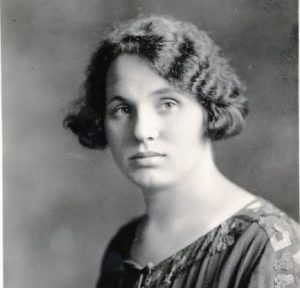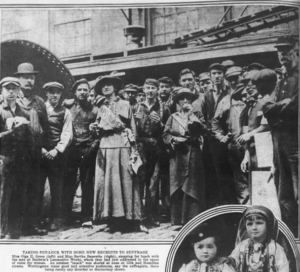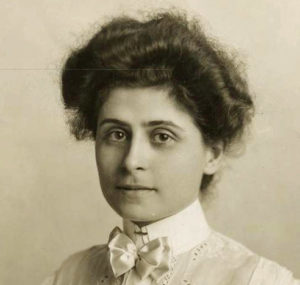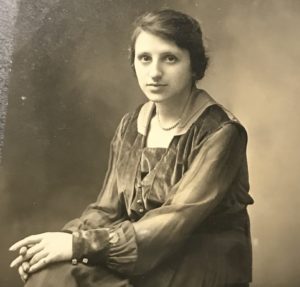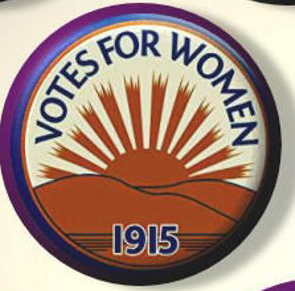Wednesday, April 6 at 7:00 p.m. at RS and livestream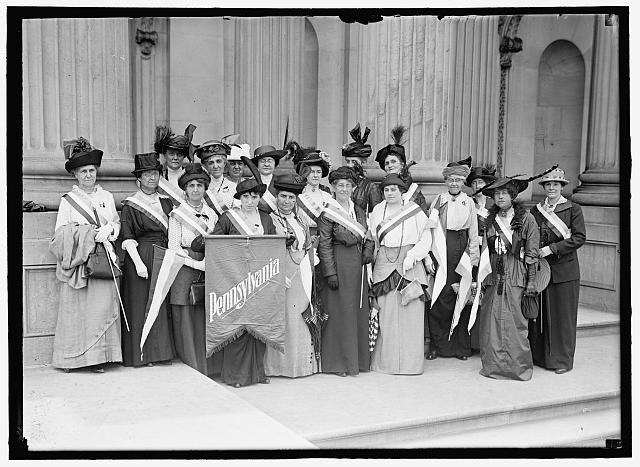
Against a background of the largest influx of immigrants in U.S. history, anti-Semitism, rising concerns about reproductive and labor rights, and a worldwide flu pandemic, Jewish suffragists in Philadelphia joined in rallying people across America to expand voting rights. Who were these local Jewish suffragists, and how did they rise above these challenges in the early 20th century to achieve major social change? What lessons can we learn from their successful advocacy to inspire today’s social justice activists?
Join us as the RS Suffrage Project presents their findings with relevance for today’s battles. Melissa Klapper, author of Ballots, Babies, and Banners of Peace: American Jewish Women’s Activism, 1890–1940, will add reflections.
Register here.
What is the RS Suffrage Project?
The RS Suffrage Project, a collaboration between Congregation Rodeph Shalom and the Temple University Feinstein Center, is a project of study and learning designed to honor the 100 year anniversary of the ratification of the 19thAmendment ensuring Women’s Suffrage. Rodeph Shalom and Temple University faculty member Marsha Weinraub chairs the project. Anyone who wants to join is welcome.
The project goal is to understand the role Jewish people played in this early American social justice movement, with special emphasis on the roles RS congregants played.
On this page, you will find information about Jewish women who were instrumental in achieving suffrage for women as well as activities for you and your family to help get out the vote this November in the spirit of our foremothers who worked so hard for the vote.
Asked about her visions for the project in the Fall of 2019, Lila Corwin Berman, professor of history and director of the Feinstein Center at Temple University, explained that project members might explore a variety of related topics. What are the historical reasons for granting, or not granting, women the right to vote? How were claims of anti-Semitism and racism lodged against the early suffrage movement handled? How are similar claims handled today? Given that the right to vote is not always protected, what are the barriers that exist today to enfranchisement not only in the U.S. but also around the world?
The project has been using this historic moment to consider implications for social justice today and our understanding of how social change occurs. Why did it take so long for women to acquire the right to vote? Why did some women, even some notable Jewish women, not participate in the movement? Is legal change enough to effect social change? Are there areas of persisting disenfranchisement today?
Rochelle Rabeeya, a noted Jewish educator and RS congregant, hoped that this project would inspire us make informed choices about participation in today's issues, build a sense of pride in learning about the achievements of the individuals involved in the movement, and explore Jewish values.
Congregants have investigated the role that Jews, particularly RS women, played in the suffrage movement. Some have visited the PA Historical Society (Ellen Poster and Linda Karp) and the Charles Library at Temple University (Tom and Carol Perloff). Their contributions have been documented in the RS Bulletin and on this website.
Patricia Moss-Vreeland chairs the Makers group that designs projects that individuals can “make” in the spirit of the early suffragists. Ellen Poster, Julia Williams, Paula Fuchsberg and Linda Karp, co-chair the Timeline group, a group dedicated to creating a timeline that shows the world, national, local and synagogue as they relate to the events leading up to the amendment passage. Come join them or start your own project!
For more information on the project, contact Marsha Weinraub.
Meet These Philadelphia Suffragists
"Suffragists: Our Jews in the News" New Days of Learning Session
Voting has arguably never been more important than now. Sit in with Julia Williams and Paula Fuchsberg of the RS Suffrage Project as they show how they discovered Jewish suffragists in Philadelphia who moved and shook the United States into granting women the right to vote 100 years ago.
Suffrage Kits
Protest is the foundation of our democracy. So is voting.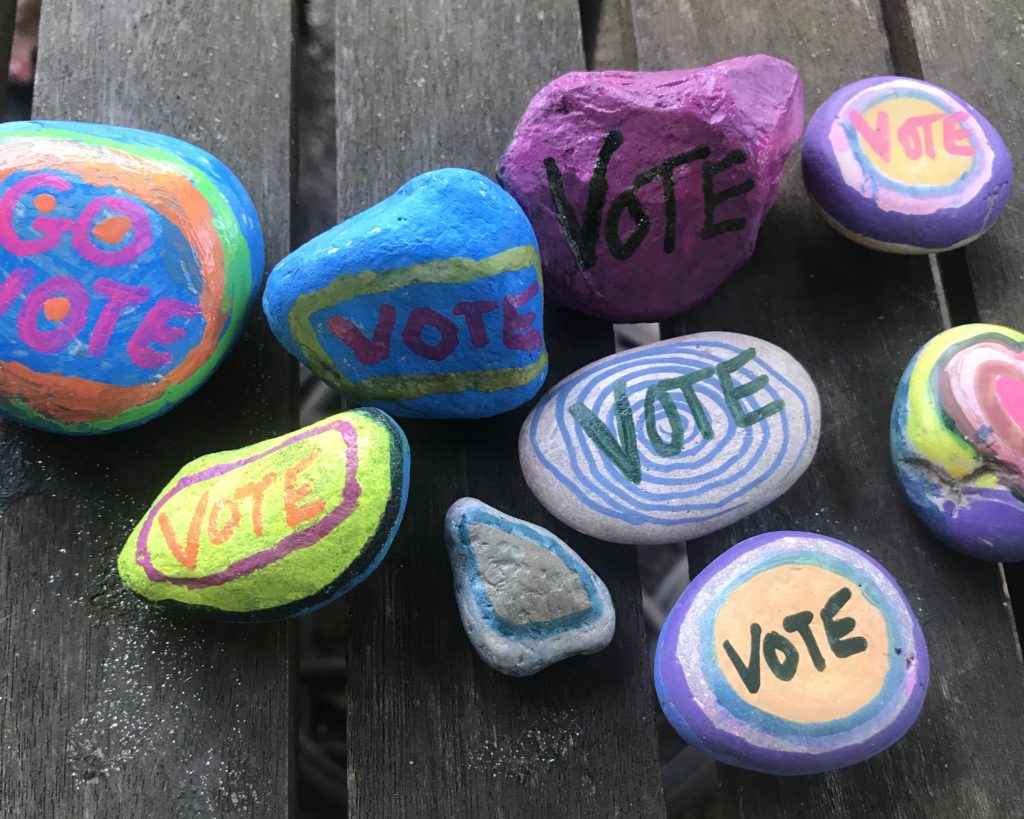
Suffrage Kits for RS families feature an assortment of hands-on activities that are educational, fun, and interactive. Designed by the RS Suffrage Project’s Makers Group, the kits provide many choices for all age groups, to explore and learn about Women’s Suffrage, the 19th Amendment, and current voting.
Each kit includes the following and comes with sample historical posters, along with samples created by members of the Makers Group. Please use slogans from the Suffrage era, or quotations of your choice to help encourage people to GET OUT THE VOTE!
- Design a Poster (Click the link to see an example)
- Design or paint rocks (see photo)
- Design a sash or banner (Click the link to see an example)
- Design buttons (see photo)
- Design a Postcard, and send through the US Postal Service. (Click the link to design your own template!)
Please share what you make. Consider placing these in spaces for viewing, giving them to your family and friends, making postcards, using the US Postal Service to help support it, and sending us your images to post on the website.
Some background: The Makers Group, part of the RS Suffrage Project, was created by Patricia Moss-Vreeland, to come together to illuminate the history and purpose of the creative use of the handmade to further the Women’s Suffrage movement. Moss-Vreeland, Linda Karp, Ellen Poster, and Julie Williams contributed work samples for this site.
Historically, the Suffragists made many handcrafted products like banners, buttons, posters, sashes, clothing, and drawings to help them get their message out while protesting. These ways of disseminating information spreads the word, informs others, and increases ways to build a movement. As we honor the Suffragists, we have been looking at all of their designs, and at how arts helped power their messaging, and helped their protests draw in more participants and supporters.
The Makers Group references this history by integrating and appropriating some of the Suffragists’ slogans, colors, and patterns with our own new slogans and imagery.
We are excited to engage you with examples of these historic pieces, along with samples of new works by members.
Women are still overlooked and undervalued. We still are fighting for equality. Join us in this mission!

